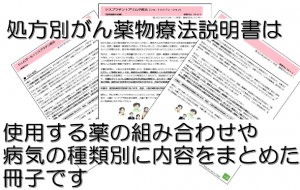The inquiries received at the “Patient Support & Inquiries” (the office for supporting patients) as well as the results from the nation-wide survey with 12,000 people have made it clear that the cancer survivors had gone through various distresses and strains. Among them, the distresses associated with cancer drug treatments are getting prominent lately. The reasons include; 1. About 70 or 80 percent of cancer chemotherapy is provided at the outpatient clinic, 2. such newly-developed drugs as molecular target drugs and immune checkpoint inhibitors are being used but the patients don’t understand what they are, and 3. chemotherapy is provided more often than before, both preoperatively and postoperatively. For example, comparing the results from the nation-wide surveys in 2003 and 2013, the percentage for the distresses and the strains on cancer drug treatments has significantly increased, which proves the fact that these issues are impacting on their lives. Currently, 70 percent of chemotherapy (anti-cancer drug treatment) is provided for outpatients at the SCC, and the percentage is increasing. The patients will have

to deal with their own deconditioning from the therapy without doctors’ help at home, so that they need to have good understanding for side effects in advance about how bad they can be and what to do with them. The information materials on chemotherapy are always there at a medical institution but they are made for doctors, nurses, and pharmacists, which are often too difficult for patients. Therefore, the descriptions have been improved and more compiled for each regimen in the newly-published “Information Prescription per Regimen for Cancer Chemotherapy.” The contents are supposed to be easy to understand for any person, not confined to a certain profession. This is part of the efforts to unify the critical information for patients as “a prescription,” compiling information on 70 regimens (i.e., combinations of anti-cancer drugs) in 91 booklets. The information can be shared by all the medical staff, as well as the patients, who can be benefited to have better understandings on the anti-cancer drug treatments that they are receiving by simply reading them.